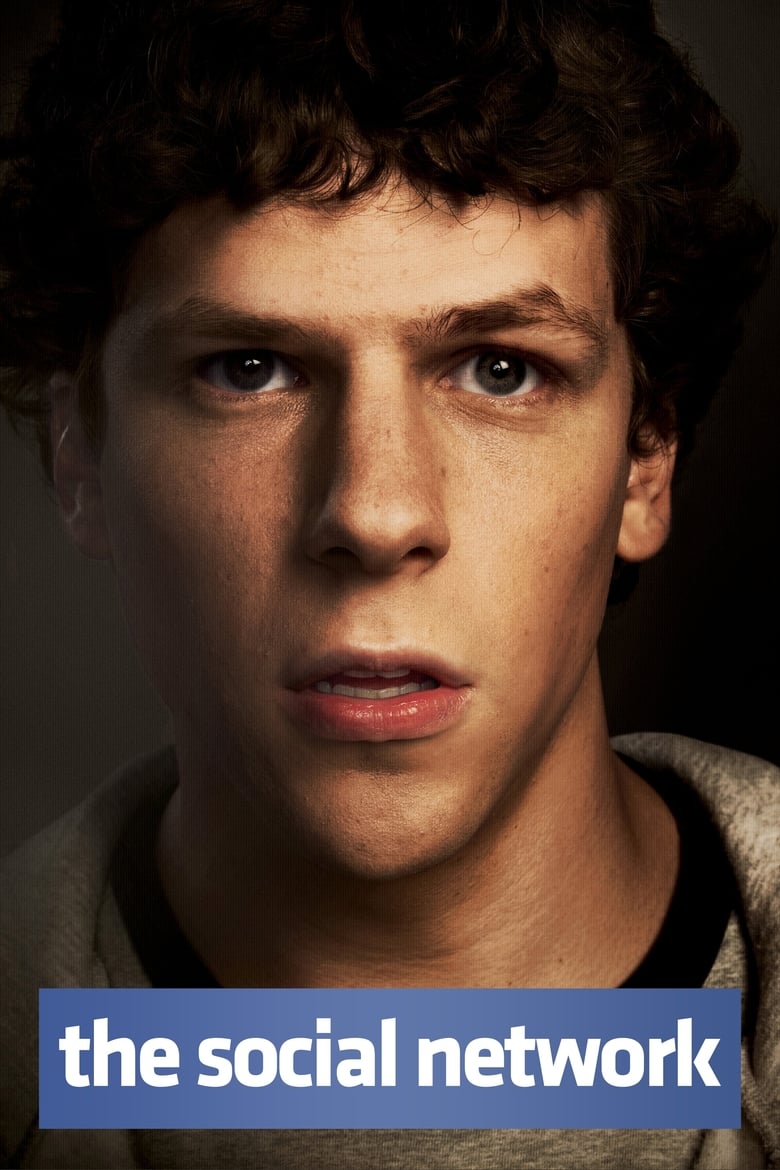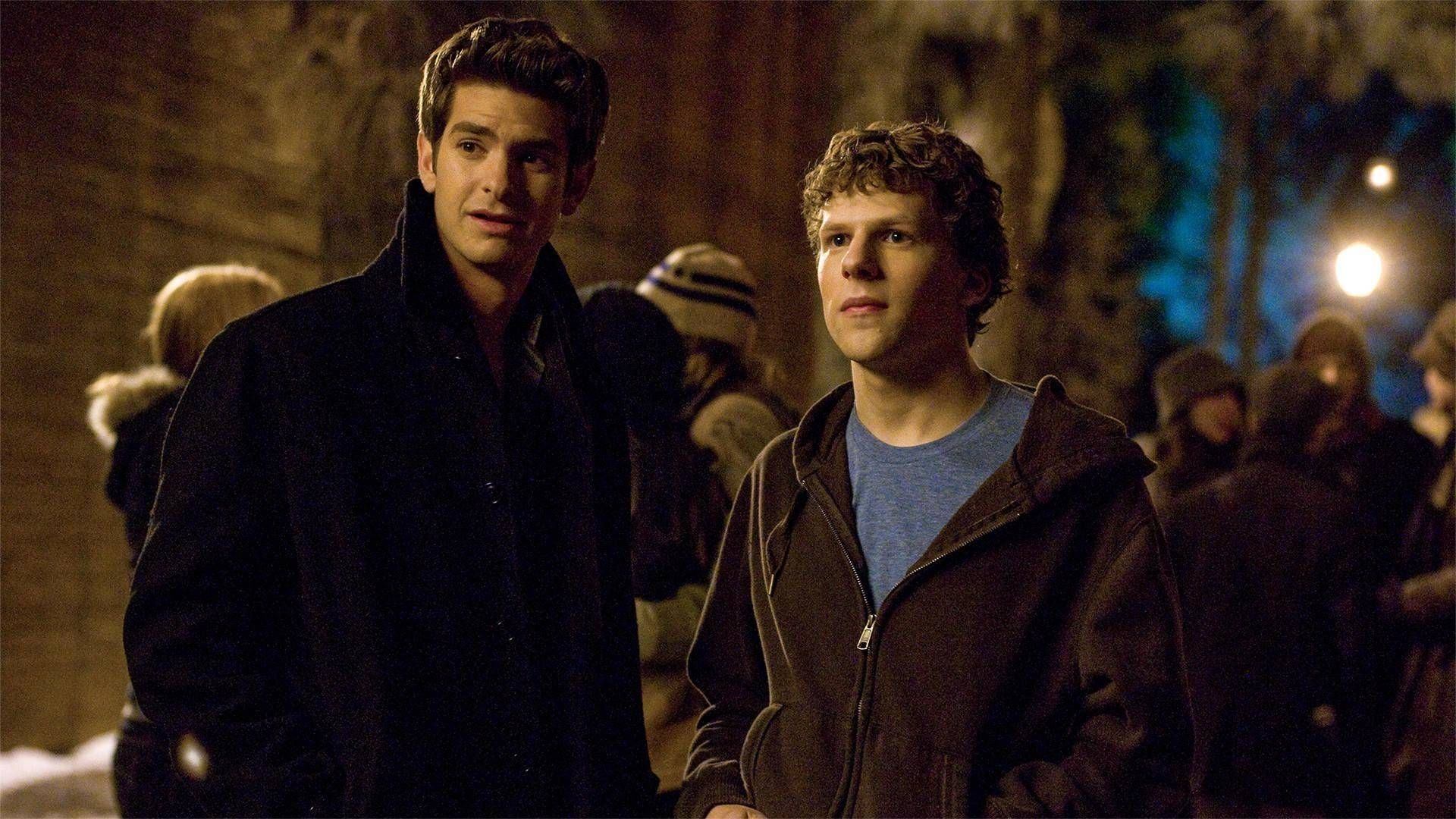
The Social Network
The tale of a new breed of cultural insurgent: a punk genius who sparked a revolution and changed the face of human interaction for a generation, and perhaps forever. Chronicling the formation of Facebook and the battles over ownership that followed upon the website's unfathomable success, The Social Network bears witness to the birth of an idea that rewove the fabric of society even as it unraveled the friendship of its creators.
Andres Gomez@tanty
Eisenberg was probably born for this role.
The story is well threaded and you don't get bored until the end. A decent movie.
Manuel São Bento@msbreviews
If you enjoy reading my Spoiler-Free reviews, please follow my blog @
https://www.msbreviews.com
Here we go with the fourth review of a David Fincher's film this week, in preparation for the upcoming Mank, directed by the same person who delivered phenomenal movies like Se7en, Fight Club, Zodiac, and more. Now, it's time for The Social Network, which premise can be summed up in "the story behind the creation of Facebook". Ten years have passed since its release, and the real Mark Zuckerberg already stated that most of the film is based on fictional events and conversations. Truth is, this movie was never marketed as a true story, but yes as an adaptation of Ben Mezrich's 2009 book The Accidental Billionaires. It's a film like any other, not a detailed account of whatever happened in real life.
With that said, this is easily one of the best adapted screenplays of all-time. Aaron Sorkin, the man behind one of the best movies of 2020 (The Trial of the Chicago 7), demonstrates his incredibly talented writing skills in The Social Network, proving that he's one of the most meticulous writers working today. If you've been reading my previous reviews, there's a couple of compliments I keep giving to Fincher, which are his extreme attention to detail and his impressive dedication to the narrative he wants to tell. So, what happens when you put together two of the most perfectionist filmmakers ever? An award-worthy, "best of the year" contender arises from their gifted minds.
There's not even much to discuss besides the narrative itself since this is, by far, the aspect that elevates the whole film. Jeff Cronenweth, who previously worked in Fight Club, brings out Fincher's trademark realistic look and feel through his simple yet powerful cinematography. Trent Reznor and Atticus Ross' original score is packed with little effects that resemble computer sounds, making it quite addictive while also increasing the movie's energy in the most exciting sequences. Finally, just like in Zodiac, the editing work (Angus Wall, Kirk Baxter) is absolutely seamless, and it's definitely the technical component that better helps Sorkin's screenplay shine due to the latter's structure.
Throughout the entire runtime, the story is told through a nonlinear timeline, mixing up Facebook's actual creation (ideas, planning, programming) with the future legal issues that Mark Zuckerberg faces. This structure allows for an exceptionally captivating and tremendously entertaining couple of hours by never letting the pacing slow down or to have an uneventful sequence. The protagonist is accused of stealing the concept from the Winklevoss twins (both interpreted by Armie Hammer), gets in trouble with his best friend, Eduardo Saverin (Andrew Garfield), over the website's monetization, and Sean Parker (Justin Timberlake) is partially the trigger for a lot of the chaos that ends up overwhelming Zuckerberg's life.
Sorkin and Fincher's greatest accomplishment is their success in making the viewer feel invested in a main character who's an utter "asshole", an adjective with a lot of weight in the film. Jesse Eisenberg is remarkable as one of those characters people "love to hate" (no wonder the real Zuckerberg didn't enjoy the movie since he's depicted as a contemptible friend). Eisenberg has a unique manner of speaking and distinctive mannerisms that are perfect for this character. Garfield and Timberlake are also formidable, incorporating their characters effortlessly. Once again, comparing with Zodiac, The Social Network is also a dialogue-driven narrative, but the latter resonated with me a bit more due to my area of work.
The only issue I have involves the Winklevoss family. Armie Hammer is excellent as both twins, as is Max Minghella as Divya Narendra, but their subplot occasionally drifts from the main story, losing my interest for those short moments. There's even a rowboat race that feels out-of-place and unnecessary, but I admit that it's gorgeously shot and accompanied by a fantastic soundtrack. Despite this little misstep, Fincher continues to impress me with his outstanding directing techniques, forcing the actors to prove their worth by making them go through their dialogues faster and implementing long takes every time that's possible.
All in all, The Social Network is yet another masterful piece of cinema, this time delivered by not one but two magnificent filmmakers. David Fincher and Aaron Sorkin employ their mutual perfectionism and meticulousness to create an extraordinarily engaging narrative. Boasting a nonlinear but tremendously effective structure, the two pillars of any film - story and characters - are wonderfully built, even reaching the point of making the viewer feel invested in a despicable yet fascinating protagonist. Jesse Eisenberg shines in a career-defining performance, but Andrew Garfield and Justin Timberlake also rise to the necessary level of dedication, dealing with the rapid-fire dialogues and outstanding long takes seamlessly. Technically, great camera work offers a realistic feel, an addictive score increases the excitement levels, and flawless editing makes the different timelines shift seamlessly. Despite an occasionally unnecessary, irrelevant detour concerning a minor subplot, this is another brilliant addition to Fincher's filmography.
Rating: A
beyondthecineramadome@beyondthecineramadome
Full review: https://www.tinakakadelis.com/beyond-the-cinerama-dome/2021/12/28/no-new-friends-the-social-network-review
Perhaps no other website has altered the course of the 21st century like Facebook. Its launch in 2004 forever changed the way society talks about social media and connects with friends and strangers, and became the lightning rod of a multitude of controversies. Conspiracy theories, political propaganda, and mass surveillance became the norm. All of it a far cry from the basic “hot or not” site Facebook sprang from.
_The Social Network_ takes the audience back to that fateful night at Harvard when a primitive version of Facebook was born in the dorm room of Mark Zuckerberg (Jesse Eisenberg) and Eduardo Saverin (Andrew Garfield). Director David Fincher and writer Aaron Sorkin are a dream team in this film. Sorkin’s signature quick dialogue is a perfect match for the pace of this movie. It gives Zuckerberg a smarminess that is easy for the audience to rally against, as though creating a website that objectifies women simply because his girlfriend dumped him isn’t enough to cause immediate dislike.

CinemaSerf@Geronimo1967
You have to wonder whether Mark Zuckerberg would ever have liked this career defining portrayal by Jesse Eisenberg? His character comes across as an arrogant ass of a man who is prepared to chuck just about everyone under the bus in order to get his original concept of an inter-connected network that enables folk to chat with each other in real time online. He is fed the germ of the idea by the Winklevoss twins (Armie Hammer) and using $1,000 from his best (and only) pal Eduardo Saverin (Andrew Garfield) is soon well on the way to developing "Facebook". That comes to the attention of the savvier Sean Parker (Justin Timberlake) but it's pretty clear that he and Saverin are no match made in heaven. As the story progresses, the personalities are quite sensitively and intensely developed as ambition takes over and Zuckerberg finds himself more and more isolated. Eisenberg is really quite effective here. His portrayal of a man who is fiercely intelligent, sarcastic and focussed is quite compelling to watch - even if it does, frequently, make you want to shoot him. Garfield, too, works well as the almost diametrically opposite sort of character who only towards the end realises he is being played and institutes the legal proceedings around which the entire biopic is based. There are so many NDAs involved to know the extent to which this might be true or just speculative, but Aaron Sorkin is at his writing best and David Fincher likewise in the director's chair as we are introduced to an embryonic industry riddled with selfishness and innovation.
